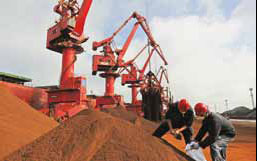|
Shandong province
For a province which has a rich history and a long tradition in maritime development, China's decision to spur its blue economy does not come as a surprise.
Shandong had in the 1990s itself realized the importance of marine resources in its economic growth and chalked out a plan to base its development on the sector.
 |
|
An iron ore port in Rizhao, East China's Shandong province. The marine related industry contributed nearly 18 percent to the province's GDP. Chen Weifeng / for China Daily
|
An iron ore port in Rizhao, East China's Shandong province. The marine related industry contributed nearly 18 percent to the province's GDP. Chen Weifeng / for China Daily "Our national economic plan used to focus largely on the development of land resources," said Fei Yunliang, head of the construction office for the Shandong Peninsula Blue Economic Zone, after the zone got government approval in January this year.
"The zone is part of China's first national marine strategy and sets the new trend for economic development," Fei said.
The economic zone covers all the offshore waters in Shandong province with an area of 159,500 sq km. It also covers 64,000 sq km of land that includes six cities - Qingdao, Dongying, Yantai, Weifang, Weihai and Rizhao - and two coastal counties in Shandong.
According to Fei, Shandong is aiming to build its primary marine industries such as ocean farming, secondary industries such as marine equipment manufacturing and new energy, and tertiary industries such as tourism.
Cheng Shenbao, president, Qingdao Electronics and Information School, is one of the entrepreneurs in Shandong who is watching the sector closely. Buoyed by the new zone, Cheng plans to launch ocean-related programs in his school soon.
"The founding of the Shandong Peninsula Blue Economic Zone offers a good opportunity for us to update the school courses and renew our school's development strategy," Cheng said.
Equipping students with aquaculture skills will be a dramatic change for Cheng's school, which has decades of history of nurturing skilled workers in the mechanical electronic industry.
Shandong peninsula, with a coastline of more than 3,000 km, ranks the second in China by the turnover of its marine sector. The marine related industry generated 604 billion yuan in 2009, and contributed nearly 18 percent to Shandong's GDP.
Apart from the edges brought by nature, Shandong also has some other advantages that will allow the province to take the lead in the blue economic wave.
The province is home to 40 percent of China's marine scientists. More than half of the national oceanic scientific research programs and many ocean research institutions are located in Qingdao, a coastal city in East China's Shandong province that also hosted the 2008 Olympic sailing events.
"We will utilize our scientific research advantage to the hilt," Xia Geng, mayor of Qingdao, said in a recent interview.
However, the number of elite ocean experts who master cutting-edge technologies are sparse in China.
By current counts, fewer than 100 Chinese scholars can be tracked on the world's ocean expert database. The number is lower than 1 percent of the global total, and accounts for just 5 percent of the experts in the United States, according to statistics from the Ministry of Human Resources and Social Security of China.
It is not that Shandong is not aware of these shortcomings. Qingdao, which has the most talents in the marine sector in China, has turned to the overseas market, to build itself as the silicon valley of China's marine economy.
The Qingdao Foreign Experts Bureau has managed to get 30 experts from abroad to work in the city. "Our ocean experts are keen to work for research organizations, as only few of them are able to transfer their academic achievement into business ventures," Yao Jihua, head of the bureau, said.
"All the 30 experts from overseas are in Qingdao not only with their subject knowledge but also with projects, which can turn into products very soon," he said, adding his bureau will continue making efforts to invite top-notch experts to work in the city.
By Meng Jing (China Daily)
Zhao Ruixue contributed to this story.
|